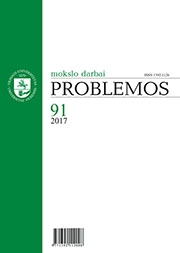F. NIETZSCHE’S IDĖJŲ RECEPCIJA M. FOUCAULT GENEALOGIJOJE: ISTORIJOS IR SOCIALINIŲ PRAKTIKŲ KRITIKOS GALIMYBĖ
RECEPTION OF F. NIETZSCHE’S IDEAS IN M. FOUCAULT’S GENEALOGICAL HERMENEUTICS: THE POSSIBILITY OF CRITIQUE OF HISTORY AND SOCIAL PRACTICES
Author(s): Arūnas MickevičiusSubject(s): Ethics / Practical Philosophy, Political Philosophy, 19th Century Philosophy, Contemporary Philosophy, Pragmatism, Hermeneutics
Published by: Vilniaus Universiteto Leidykla
Keywords: incompleteness of interpretation; genealogy; hermeneutics; archeology; social criticism; power;
Summary/Abstract: The aim of the paper is to explicate Foucault’s interpretational access to Nietzsche’s basic concepts; second, to show Nietzsche’s importance for the development of M. Foucault‘s genealogy; and third, to disclose how Foucault’s genealogical research in polemics with J. Habermas turns to the problem of legitimizing the question “How can genealogical history and a variety of social practices criticism?” This article is intended to support the thesis that genealogical research developed by Foucault can be seen as legitimate historical and social practice and an alternative to Habermasian project.
Journal: Problemos
- Issue Year: 2017
- Issue No: 91
- Page Range: 71-86
- Page Count: 16
- Language: Lithuanian

